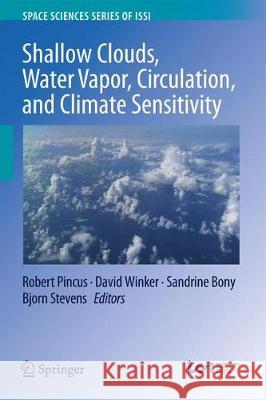Shallow Clouds, Water Vapor, Circulation, and Climate Sensitivity » książka



Shallow Clouds, Water Vapor, Circulation, and Climate Sensitivity
ISBN-13: 9783319772721 / Angielski / Twarda / 2018 / 396 str.
Shallow Clouds, Water Vapor, Circulation, and Climate Sensitivity
ISBN-13: 9783319772721 / Angielski / Twarda / 2018 / 396 str.
(netto: 535,46 VAT: 5%)
Najniższa cena z 30 dni: 539,74
ok. 22 dni roboczych.
Darmowa dostawa!
Preface to the Special Issue “ISSI Workshop on Shallow Clouds and Water Vapor, Circulation and Climate Sensitivity”
Robert Pincus is a senior research scientist at the Cooperative Institute for Research in Environmental Sciences at the University of Colorado. He works on problems at the nexus of clouds, radiation, and climate ranging from practical questions as to how radiation calculations may be optimally coupled to modeling systems, through efforts aimed at the robust comparison of models and remote sensing observations, to a range of contributions synthesizing how observations of the past and projections of future change can be synthesized.
David Winker is a senior scientist at NASA Langley Research Center and Principal Investigator of the CALIPSO satellite mission. His work focuses on the use of lidar and combined lidar and passive observations to better understand atmospheric aerosols and clouds. His efforts have ranged from the development of space lidar systems and innovative retrieval techniques to the development of global lidar data products tailored to the needs of the climate and operational weather forecast communities. CALIPSO global cloud products have served as benchmark references for the GEWEX Cloud Assessment and for the evaluation of cloud thermodynamic phase in global models, leading to new insights into the behavior of clouds and guiding the improvement of models.
Bjorn Stevens is a director at the Max Planck Institute for Meteorology, where he leads the Atmosphere in the Earth System Department, and a professor at the University of Hamburg. His research, which uses a wide range of methodologies to study how water in the atmosphere influences Earth’s climate, has made important contributions to understanding of how turbulent mixing and cloud microphysical processes influence the structure and organization of clouds. In showing how these processes influence the cloud response to warming, and how radiative forcing responds to aerosol perturbations, his research has proven instrumental for our present comprehension of climate change.
Sandrine Bony is a Director of Research at the National Center for Scientific Research (CNRS) in France, working at the Laboratoire de Météorologie Dynamique (LMD) of Sorbonne University. Her research aims at understanding the role of clouds in climate and in climate change through modeling, observational and theoretical approaches. Her most important contributions include unraveling the physical mechanisms through which clouds respond to climate change and influence climate sensitivity, showing the influence of the organization of tropical convection on climate, and understanding the ways in which clouds and precipitation couple to atmospheric circulations.
1997-2026 DolnySlask.com Agencja Internetowa
KrainaKsiazek.PL - Księgarnia Internetowa









